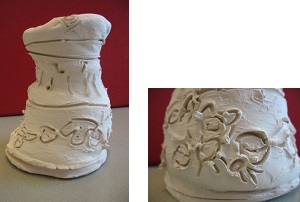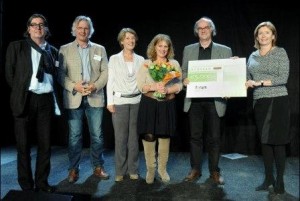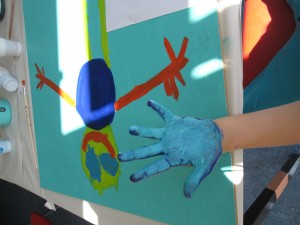Since 2022, KenVaK has been a consortium partner of SPREAD+ (Sustainable and PeRsonalisEd Advances in Dementia care). SPREAD+ aims to improve the quality of life of people with dementia, their care partners and healthcare and welfare professionals by offering tailor-made applications that use innovative psychosocial and technological support in all phases of dementia care and support. As part of the ZonMw Dementia Research Programme, the consortium consists of a national collaboration of universities, universities of applied sciences and other knowledge institutions, in addition to practical organisations and companies. SPREAD+...
Researches
-
Sustainable and PeRsonalisEd Advances in Dementia care (SPREAD+)
-
Exploring brain activity in response to Emotion Regulation Improvisational Music Therapy (EIMT) for young adult students with depressive symptoms: An fMRI multiple-case study (Ex-fMRI-EIMT)
Depression is a serious problem, also among young adult students. In order to reduce depressive symptoms and promote well-being, the music therapy program Emotion-regulating Improvisational Music Therapy (EIMT) was developed by Sonja Aalbers. After participating EIMT, young adult students in a University context may experience less depressive symptoms, improvement of their emotion regulation in stressful situations and less negative feelings. This research focuses on understanding the underlying EIMT mechanisms, including changes in brain activity of young adult students after participating EIMT. It is assumed that brain activity of these...
-
Implementation of music therapy for people with dementia living at home
This study investigated the success and failure factors of the implementation of a blended music therapy intervention for people with frontotemporal dementia living at home and their caregivers. The intervention consisted of individual music therapy for three months combined with a customized digital support program that was offered via a tablet and could be used at any time by the person with frontotemporal dementia and/or caregiver(s). After this intervention period, both the participants and the music therapists were interviewed to evaluate their experiences with the intervention. In addition, the...
-
(Be)Leef in de wijk – RAAK Publiek
Recently, healthcare professionals and researchers in the Netherlands have set up initiatives aimed at developing care and support services in the community which are especially geared towards people with a mild intellectual disability and associated conditions. The aim of these initiatives is to reduce the number of people with mild intellectual disabilities who are referred or re-referred to in-patient care as much as possible, with the view of enabling these people to live in their own home, enjoying a good quality of life, for as long as possible. It is...
-
Creative minds
Nowadays, there is a large demand to prove the effectiveness of arts therapies and increase the evidence of this. When researching the effectiveness of these therapies, questionnaires are often used or research is based on the experiences of clients. Due to therapies' experiential and activity-oriented nature, it is conceivable that we need to study more unconscious processes by performing measurements on the body in order to produce a picture of the effects of these therapies. Within the framework of the project 'Creative Minds,' a community of practice will be...
-
“Resilient Together: Learning to Move through Music”: Resilience in Stress for People with Intellectual Disabilities (ID) and Their Social Environment: What Can We Learn from Each Other
There is a practical and knowledge gap regarding suitable interventions to reduce stress and enhance resilience in the collaboration between people with intellectual disabilities, their family members, and caregivers. Preliminary outcomes of this project showed that the use of expressive therapies (music and movement) is a promising approach. The goal of this research is to develop a scientifically validated, practically tested intervention design that addresses two key aspects: a) strengthening resilience in dealing with stress for both the person with intellectual disabilities and their family members and caregivers, and b)...
-
Music Interventions for Stress Reduction
The goal of this dissertation is to contribute to the body of scientific knowledge on music interventions for stress reduction. To cope with the negative impact of stress, millions of people around the world use tranquilizing medication, which in turn is associated with numerous contraindications and negative side effects. Therefore, there is an urgent need to develop and examine innovative and non-pharmacological interventions for stress reduction, especially for patient populations known to be more vulnerable to stress such as those with mild intellectual disabilities (MID). Moreover, the stress-reducing qualities...
-
Stay tuned – ZonMw
Stay Tuned focuses on the working relationship between arts therapists and young people who are involuntarily admitted to a mental health institution. Arts therapists indicate that fostering a working relationship, which is also referred to as a 'working alliance,' between the young people and the therapist is an important component in their therapy. General factors such as empathy, trust, and safety play an important role within the working alliance between the young person and the arts therapist. Therapists believe a working alliance makes a crucial contribution to achieving goals:...
-
Art therapy: observation in art therapy
|
The main goal of art therapy observation and assessment is to gain insight in a client’s mental health and functioning. Based on assessment, it can be decided whether the client may benefit from art therapy, the focus of treatment and which interventions contribute to the clients’ mental health. This research shows how aspects of clients’ mental health are expressed in clients’ art making processes (i.e. material interaction) and art products in art therapy assessment. Would you like to read the thesis 'Art form and mental health. Studies on art therapy...
-
Art therapy for children with autism spectrum problems
| dr. Celine Schweizer

Children with autism are often referred to art therapy sessions. This is because they suffer from communication problems, often have a negative image of themselves, and have behavioural problems (Schweizer et al., 2014). However, little is currently known about the effects and the effectiveness of the treatment. This PhD research consists of four phases:
-
Art therapy for personality disorders….. does it work?
| dr. Suzanne Haeyen
This two-part research project focuses on art therapy amongst patients with Cluster B and C personality disorders. The first part concerns the development of an effective, practicable, and specific arts therapy feedback instrument for this target group. The art therapy can be monitored and, if required, adjusted through the systematic use of patient feedback. We will test the art therapy feedback instrument (BTV-PS b/c) according to its reliability, validity, and usability, and will also compile instructions on how to use it. We will use the questionnaire as a basis to...
-
Specialised music education of children
Amongst other things, this research will further explore the effect of specialized music educatoin on the mental and physical functioning of children aged between six and nine years old. Specialised music education aims to encourage the child to further develop his or her musical, cognitive, emotional, and motor abilities. Given the impact of executive functions on learning conditions and learning achievements, this research specifically hones in on the effects this method has on executive functioning. Using an experiment-like approach, the project will gather data regarding the executive functioning, learning achievements, and...
-
Gaming in therapy – RAAK publiek
|
In the Netherlands, around 175,000 children and young people struggle with the effects of a mental disorder which restricts them in varying degrees in their day-to-day life (Dutch Association of Mental Health and Addiction Care , 2015). Despite the availability of effective treatments, it is not possible to provide effective treatment to a considerable number of young people. The 'Games 4 Therapy' project by RAAK is a cooperative project between institutions offering prospective healthcare professionals practical training and knowledge centres. It aims to develop an applied game which...
-
Timing in music therapy for children with autism spectrum disorder
In her doctoral thesis entitled Geteilte Zeit - gemeinsame Zeit: Entwicklung eines Messinstruments zum Timing in der Musiktherapie mit autistischen Kindern' (Shared time - time together: Development of a measuring instrument for timing in music therapy with autistic children), Kathinka Poismans describes the measuring instruments she calls 'InTiME,' an acronym which stands for 'Instrument for Timing in Music Therapy Evaluation'. The instrument measures the timing in the musical interaction between the music therapists and the autistic child. People with autism demonstrate divergent timing within social interactions. For instance, they...
-
Implementation route for ‘m’n Mattie’ – ZonMw
The current psychiatric treatment of children and young people consists primarily of classic therapies which take place at the mental health care facility. However, interviews with young people have shown that they would prefer to be contacted via Internet or social media. The use of interactive media, game elements, and applied games is also an effective method of motivating young people to alter their behaviour. Mental health care facilities have developed the app 'M'n Mattie' ('My Mate') to give young people and their parents more control over their treatment...
-
Music therapy in people with dementia – promotion
This page is only visible in Dutch. For Dutch please click here.
-
Arts therapies within youth forensic institutions – RAAK Publiek
| , Julie Kil, Dr. Henk Smeijsters

The project, which ran from 2009 to 2011, was carried out to develop effective best practices in the field of arts therapies within youth forensic institutions for young people and secured youth mental health care units. In 2011, the project was awarded the prize for the best practically-oriented research by the Netherlands Association of Universities of Applied Sciences. The results from this project are described in a framework document for all arts therapies and five e-books. Please see the 'publications' section on this site. This project was made possible by...
-
Innovative arts therapies in the mental health care facility – RAAK publiek
| , Drs. Lia van der Maas, Drs. Henriette Visser
The project, which ran between 2011 to 2013, was the product of a specific request from the arts therapists at the Vincent van Gogh mental health care facility to receive support for the development of new interventions for integrated care. The project aims to develop efficient and effective arts therapies, or 'best practices,' for people with mental health disorders, which will be applied in the new practice of integrated care. These interventions were developed by creating communities or practices within the organization, after which the interventions were evaluated by...
-
Arts therapies in youth work – RAAK publiek
| , Peter Daemen, Elsa van den Broek, MDTh, Dr. Tineke Schoot

Within the framework of this project, which ran from 2011 to 2013, arts therapists and youth workers joined forces to develop, carry out, and evaluate innovative interventions. The goal of these interventions was to empower vulnerable young people in the community. Vulnerable young people are those who are confronted with an accumulation of problems which have a negative impact on their development and which can lead to psychosocial issues, problem behaviour, troublemaking, and delinquency. The RAAK programme began by taking stock of literature, expert knowledge, and ongoing projects in order to better...